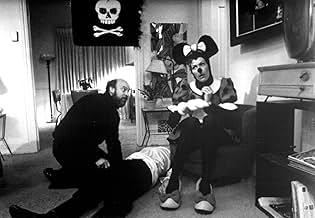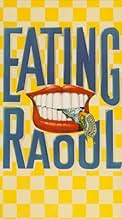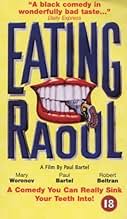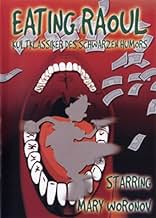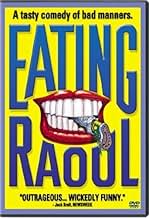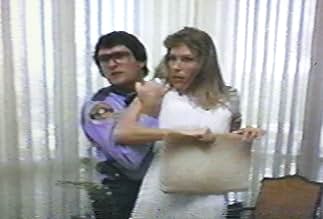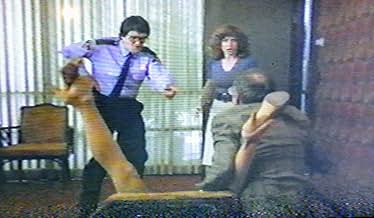AVALIAÇÃO DA IMDb
6,8/10
9,7 mil
SUA AVALIAÇÃO
Adicionar um enredo no seu idiomaA relatively boring Los Angeles couple discovers a bizarre, if not murderous, way to get funding for opening a restaurant.A relatively boring Los Angeles couple discovers a bizarre, if not murderous, way to get funding for opening a restaurant.A relatively boring Los Angeles couple discovers a bizarre, if not murderous, way to get funding for opening a restaurant.
- Direção
- Roteiristas
- Artistas
- Prêmios
- 2 indicações no total
- Direção
- Roteiristas
- Elenco e equipe completos
- Produção, bilheteria e muito mais no IMDbPro
Avaliações em destaque
With filmmakers so cynical and despairing today about America, it's refreshing to see a film with so much faith in the American dream. This is a classic tale of rags to riches, of a respectable married couple, down on their financial luck, who, with initiative and a novel idea, manage to fulfil their dream, a hotel in the country. If, to get there, they must pose as bondage merchants, murder their clients, rob their wallets, give the bodies to a petty thief who sells them to dog-food companies as choice meat, than such is the nature of success.
RAOUL declares itself as a true story from the Sodom and Gomorrhah of Hollywood, where fantastic wealth co-exists with degrading poverty. The film is a moral tale, about steering the middle-course, about what it takes to be normal and decent. It plays like straight John Waters, but just as hysterical, even if, eventually, it cannot sustain itself.
The featured couple are called, appropriately, the Blands, and it is significant that their serial-killing weopon is a lethal frying-pan. Paul, played by the director, is the epitome of his name: balding, pedanctic, so obsessed with fine wines that he gets fired from his low-rent off-licence for over-ambition. His wife, Mary, is less bland, which is why she is more easily tempted by the dark side. While Paul remains sweetly virginal, she, a hospital nutritionist, works in an evnironment where she is continually harrassed by lecherous lotharios, and is knowledgeable enough to know that the most humiliating revenge is to have them receive their enema from a burly dandy.
Bartel is a Roger Corman alumnus, and this can be seen in the fluid, economical filming, the functional set-ups that are actually quite complex. The film's very classical structure is at odds with (piecemeal) filming that has characters seem, ineptly, to wander up to the camera, although this has the unsettling effect of making the creepy nonsense seem curiously real.
There is also a hint of suppressed Gothic in the telling - Mary's hysterical normality is so camp she could be Vampira - while the Blands' blandness is under attack from all sides. It's bad enough to have 'swingers' (a charmingly 50s word for perverts that chimes with the Blands' adorably tasteless 50s furniture left them by Mary's mother until she dies) crowding the tenement for sleazy, Warholian, sado-masochistic parties, but to have one of them storm into your apartment, throw up all over your carpet, nearly die in your lavatory, bring your husband to the party to be humiliated/initiated by Doris the Dominatrix, and then come back to violate your wife, is an imposition.
The film makes satirical points enough - the rich and professional classes are all vile, violent sleazes, while the S&M 'sickos' are sweet, loving mothers who live in pleasant suburban avenues so indifferent to capitalist Darwinism that they help out the competition. The racism needed to keep normality normal is shown in the horrifyingly hilarious shooting of a store-robber, or in the final fate of self-confessed 'Chicano' Raoul, which suggest Peter Greenaway might be a fan of the film. The cannibalism theme has a long satirical history in jibes on the bourgeoisie, and it's no surprise to learn that Bartel is a devotee of Bunuel.
But the film's real satire is to show how normality must survive in a society, Hollywood, that has obliterated any recognised sense of reality.
RAOUL declares itself as a true story from the Sodom and Gomorrhah of Hollywood, where fantastic wealth co-exists with degrading poverty. The film is a moral tale, about steering the middle-course, about what it takes to be normal and decent. It plays like straight John Waters, but just as hysterical, even if, eventually, it cannot sustain itself.
The featured couple are called, appropriately, the Blands, and it is significant that their serial-killing weopon is a lethal frying-pan. Paul, played by the director, is the epitome of his name: balding, pedanctic, so obsessed with fine wines that he gets fired from his low-rent off-licence for over-ambition. His wife, Mary, is less bland, which is why she is more easily tempted by the dark side. While Paul remains sweetly virginal, she, a hospital nutritionist, works in an evnironment where she is continually harrassed by lecherous lotharios, and is knowledgeable enough to know that the most humiliating revenge is to have them receive their enema from a burly dandy.
Bartel is a Roger Corman alumnus, and this can be seen in the fluid, economical filming, the functional set-ups that are actually quite complex. The film's very classical structure is at odds with (piecemeal) filming that has characters seem, ineptly, to wander up to the camera, although this has the unsettling effect of making the creepy nonsense seem curiously real.
There is also a hint of suppressed Gothic in the telling - Mary's hysterical normality is so camp she could be Vampira - while the Blands' blandness is under attack from all sides. It's bad enough to have 'swingers' (a charmingly 50s word for perverts that chimes with the Blands' adorably tasteless 50s furniture left them by Mary's mother until she dies) crowding the tenement for sleazy, Warholian, sado-masochistic parties, but to have one of them storm into your apartment, throw up all over your carpet, nearly die in your lavatory, bring your husband to the party to be humiliated/initiated by Doris the Dominatrix, and then come back to violate your wife, is an imposition.
The film makes satirical points enough - the rich and professional classes are all vile, violent sleazes, while the S&M 'sickos' are sweet, loving mothers who live in pleasant suburban avenues so indifferent to capitalist Darwinism that they help out the competition. The racism needed to keep normality normal is shown in the horrifyingly hilarious shooting of a store-robber, or in the final fate of self-confessed 'Chicano' Raoul, which suggest Peter Greenaway might be a fan of the film. The cannibalism theme has a long satirical history in jibes on the bourgeoisie, and it's no surprise to learn that Bartel is a devotee of Bunuel.
But the film's real satire is to show how normality must survive in a society, Hollywood, that has obliterated any recognised sense of reality.
One of the greatest comedies ever made (right up there with National Lampoon's Vacation, Caddyshack, Dumb and Dumber, and Clerks) that really makes a strong statement about swingers, s&m, rape, murder, and cannibalism without becoming tasteless. This is Bartel's greatest accomplishment. A major cult hit and deservingly so.
* * * *
* * * *
Meet the Blands, the aptly named middle-aged square couple. He's a wine expert, she's a nurse, and they need money to finance their dream restaurant. Trouble is, they're barely making ends meet. What's worse, the apartment complex they live in is infested with swingers, back when swingers were as commonplace as yuppies are now. Mary and Paul find the answer to their problems when one of the swingers tries to put the moves on Mary in their apartment. Paul whacks him with a frying pan, killing him, and they discover the fella's carrying a lot of cash. Bingo! Light over heads! What makes this goofy premise work is the absolutely hilarious, dead-on, deadpan performances of Paul Bartel and Mary Woronov as the Blands. They don't give what you'd call comedic performances, but what they say and what they do seems funny, as they are a duo of decorum surrounded by a storm of decadence. Their performances, combined with a witty and biting (pardon the pun) script, make this an absolute delight, a must for lovers of off-beat movies.
Paul and Mary Bland (Paul Bartel and Mary Woronov) are a VERY goody-goody down to earth couple who want to open a restaurant but they can't get the money. One night Paul kills a man who attacks Mary. They find out he has lots of money. So they decide to put up a sexual ad, lure men into their apartment, kill them and take their money. Then hot hunky Raoul (Robert Beltran) finds out and demands a cut.
I caught this back in 1982 at a theatre. Back then it was a VERY dark and funny comedy. A big hit too. Now, 30 years later, it's still funny but not even remotely as outrageous as it used to be. We've gone beyond this movie in terms of black comedy. Also I found it sometimes too low-key. Still it was enjoyable. Bartel and Woronov are both great in their roles. They were friends in real life and their affection for each other comes through. Also they are hysterical in their roles. Beltran is pretty good too. He's not as good as comedy as Bartel and Woronov but he's young, handsome and hunky and that's what the role calls for. Also Susan Saiger is great in her small role as Doris the dominatrix. This movie is not explicit--the murders are all off screen and there's no blood or gore. So it's funny but not that black anymore. I give it a 7.
I caught this back in 1982 at a theatre. Back then it was a VERY dark and funny comedy. A big hit too. Now, 30 years later, it's still funny but not even remotely as outrageous as it used to be. We've gone beyond this movie in terms of black comedy. Also I found it sometimes too low-key. Still it was enjoyable. Bartel and Woronov are both great in their roles. They were friends in real life and their affection for each other comes through. Also they are hysterical in their roles. Beltran is pretty good too. He's not as good as comedy as Bartel and Woronov but he's young, handsome and hunky and that's what the role calls for. Also Susan Saiger is great in her small role as Doris the dominatrix. This movie is not explicit--the murders are all off screen and there's no blood or gore. So it's funny but not that black anymore. I give it a 7.
Paul Bartel's ultra-low budgeted quickie is still one of the best black comedies ever made, even though I found it less funny than when I first saw it, approximately ten years ago now. Then again, it was my very first "politically incorrect" comedy and I've seen many others since
This is a very charming film and the reasons why it works so well especially are the overly eccentric characters and the straight-faced acting performances of the talented B-cast. Writer/director Bartel and his favorite B-movie muse Mary Woronov star as an uptight and exaggeratedly square couple, the Blands, who're social outcasts in the wild L.A. region. Paul and Mary dream of opening their own little restaurant in the countryside but they have trouble financing it, while so many "swingers" waste their money on parties and bizarre sexual fetishes. After a first and accidental homicide, Paul and Mary find out that they could make easy money by luring more perverts to their apartment and kill them. The situation gets more complicated when Latino-crook Raoul discovers what the couple is doing. There aren't any special effects or gore and the set pieces aren't at all spectacular
and yet this little gem is entertaining from start to finish! Especially the first half (when you make acquaintance with the bizarre Blands) is terrific, with brilliant dialogues and offensive yet very clever black humor. It's obvious that Paul Bartel was an acolyte of the all-mighty Roger Corman, since he manages to deliver a fun movie without a large budget being required. The gags are simple - often not more than the sound of a frying pan hitting a human head but it works and the atmosphere is so tongue-in-cheek that you can't but love what you see. I do wish that the film had been a little longer, especially since the ending comes so abrupt! "Eating Raoul" also contains many interesting trivia aspects, like for example the name of the co-writer, Richard Blackburn. Especially when you're familiar with Blackburn's other (and only) film "Lemora: a Child's tale of the Supernatural", this screenplay is a giant change in style. The supportive cast is marvelous as well, with the dazzling Susan Staiger as "Doris the Dominatrix" and Ed Begley Jr. as a pot-smoking hippie! Good fun!
Você sabia?
- CuriosidadesThe budget was so low that they could not afford to mock-up an ad printed in a fake newspaper for the Blands' swingers advertisement so production designer Robert Schulenberg instead designed an ad and ran it in the "L.A. Weekly," an alternative newspaper. Unlike the vast number of replies the Blands got in the movie, the real ad attracted only one response.
- Erros de gravação(at around 1h 15 mins) When Paul throws the bug zapper, it hits the camera, causing the camera to shake up and down and go out of focus.
- Cenas durante ou pós-créditosThere is a credit for "Guest Electrician"
- ConexõesFeatured in Precious Images (1986)
- Trilhas sonorasExactly Like You
Music by Jimmy McHugh
Lyrics by Dorothy Fields
Published by Shapiro, Bernstein, and Co., Inc.
Performed by Jonathan Beres
Principais escolhas
Faça login para avaliar e ver a lista de recomendações personalizadas
- How long is Eating Raoul?Fornecido pela Alexa
Detalhes
- Data de lançamento
- País de origem
- Idiomas
- Também conhecido como
- Eating Raoul
- Locações de filme
- 1600 Argyle Avenue, Hollywood, Los Angeles, Califórnia, EUA(Paul passes the Cathay de Grande nightclub while on top of the van)
- Empresas de produção
- Consulte mais créditos da empresa na IMDbPro
Bilheteria
- Orçamento
- US$ 350.000 (estimativa)
- Tempo de duração
- 1 h 30 min(90 min)
- Mixagem de som
- Proporção
- 1.85 : 1
Contribua para esta página
Sugerir uma alteração ou adicionar conteúdo ausente


